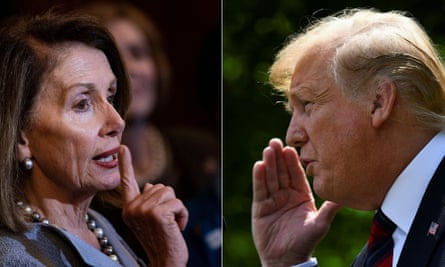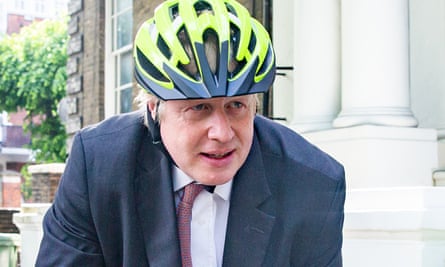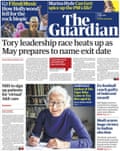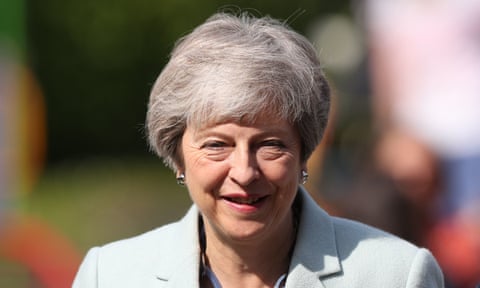Top story: PM to meet 1922 committee chair this morning
Good morning and welcome to the final briefing for the week, as calls for Theresa May’s departure reach a deafening pitch.
The PM is widely expected to set out a timetable for her departure today, after a meeting with Sir Graham Brady, the chair of the Tory backbench 1922 committee. The PM’s allies think she will promise to go by 10 June, after Donald Trump’s state visit to Britain, and then stay until her successor has been chosen (which is expected to take several weeks). The pressure to name a date follows frank discussions with the foreign secretary, Jeremy Hunt, and home secretary, Sajid Javid, in which they told her they could no longer support her Brexit strategy which opens the door to a second referendum. Pile on the predicted Tory wipeout in the European elections and the PM’s options have seriously, perhaps fatally, narrowed. (You can read how disaffected voters across the north-west turned to Nigel Farage’s Brexit party on Thursday and about the pollsters’ predictions on the European elections). May’s anticipated departure comes amid deep concerns among centrist cabinet ministers that candidates to be the next prime minister will have to promise a hard Brexit. In the meantime, Peter Walker has outlined the likely frontrunners and Rowena Mason reports that Boris Johnson’s bid for the leadership is gathering momentum.
Julian Assange espionage charges – The Wikileaks founder could face decades in jail in the US after American prosecutors added 17 additional charges under the Espionage Act. He was previously charged with working to hack a Pentagon computer system but now faces a maximum sentence of 175 years if convicted of all the charges. WikiLeaks editor-in-chief, Kristinn Hrafnsson, labelled the new charges “the evil of lawlessness in its purest form”, adding: “With the indictment, the ‘leader of the free world’ dismisses the First Amendment – hailed as a model of press freedom around the world – and launches a blatant extraterritorial assault outside its border, attacking basic principles of democracy in Europe and the rest of the world.”
The new charges against Assange raise profound questions about the freedom of the press under the first amendment of the US constitution. You can read the Guardian’s world affairs editor, Julian Borger, on what it means for free speech, including how the Trump administration has “crossed a line that every other US administration has shied away from: challenging the first amendment in defence of government secrets”.
Meanwhile, President Trump has come under fire from the Democratic House speaker, Nancy Pelosi, who has called for an “intervention”. Asked at her weekly news conference whether she was concerned about the president’s well-being, she replied: “I am”. As Ed Pilkington writes, she then delivered the coup de grace: “I wish that his family or his administration or staff would have an intervention for the good of the country. Maybe he wants to take a leave of absence.”

A&E ‘virtual’ revolution – Millions of patients will be encouraged to use digital technology to assess how ill they are under a groundbreaking initiative at the University Hospitals Birmingham (UHB) trust. As part of a drive to reduce the use of hospital appointments, patients will be advised to use online – live and automated – chat services, online symptom checkers and video consultations with doctors and nurses to help relieve the “unsustainable” pressure on resources. The “artificial intelligence triage” will then tell them if they need to seek treatment or not. Patients will also be able to talk to their consultant using their smartphone at home or work and not have to go to the hospital itself for an outpatient appointment.
Meanwhile, Public Health England is warning that anyone who has not been vaccinated for measles or who has a child who missed a dose of the MMR vaccine, should see their GP, given widespread outbreaks in Europe. PHE is particularly concerned about families and students who are likely to travel to Europe this summer.
Climate strikes – Hundreds of thousands of children and young people will take to the streets again today as the school strike movement continues to snowball. Actions are planned in 1,400 cities across more than 110 countries. Organisers say the number of young people taking part is set to top the 1.4 million people who participated in the global day of strikes in March. More than 100 demonstrations are planned in the UK. Labour, meanwhile, has pledged to put the climate emergency on the school curriculum. The party’s shadow education secretary, Angela Rayner, said a Labour government would ensure that the climate crisis was an educational priority and that all young people were taught about its ecological and social impact.
Unfair blame – The National Audit Office has criticised the Home Office for failing to protect foreign students wrongly accused of cheating in an English language test they were required to sit as part of a visa application process. About 2,500 students were forcibly removed from the UK and a further 7,200 left the country after being warned they faced detention and removal if they stayed. Many protested their innocence and of 12,500 appeals in UK courts so far, 3,600 people have been vindicated. Sir Amyas Morse, the head of the NAO, said: “When the Home Office acted vigorously to exclude individuals and shut down colleges involved in the English language test cheating scandal, we think they should have taken an equally vigorous approach to protecting those who did not cheat but who were still caught up in the process, however small a proportion they might be. This did not happen.”
Everest’s fatal queues – Hundreds of climbers hoping to make it to the summit of the world’s tallest mountain have been forced to wait for hours in freezing temperatures at high altitude, as congestion built up at the peak. The delays have been linked to the deaths of at least three people. An American man and an Indian man and a woman all died as they descended, local media said. The Kathmandu Post said the deaths had all been linked to the lengthy queues above 8,000 metres (26,200 ft) – known as the Death Zone. A spell of good weather has apparently prompted many of those granted permission to climb this year to go for the summit at the same time, the paper said.

Today in Focus podcast: The end of May: are we headed for Boris Johnson as prime minister?
Theresa May appears to have entered the final phase of her leadership, with rivals waiting to pounce on the chance to succeed her. Patrick Wintour lays out the route ahead but can anyone stop the clear favourite? Also today: Claire Armitstead on the outpouring of love for children’s author Judith Kerr, who died on Thursday at the age of 95.

Lunchtime read: How singers have become Hollywood’s superheroes
The Avengers may have fought their last battle, but this summer’s superhero will be Elton John (or Taron Egerton) and his superpower is – Hollywood hopes – getting bums on seats in a projected $25m opening weekend, writes Laura Snapes. It follows the success of A Star Is Born and Bohemian Rhapsody. More will follow, including Danny Boyle’s Yesterday, a romcom that asks what life would be like if the Beatles had never existed; Elle Fanning will play a reality show hopeful in Teen Spirit; and Renée Zellweger as Judy Garland in Rupert Goold’s biopic Judy.
So why the sudden rush of music blockbusters? Martha Shearer, a teaching fellow in film studies at King’s College London, says that “some of these films have an emphasis on being plucked out of the crowd” that perhaps speaks to our age of reality talent shows and the “social media generalisation of fame”. But more than that, she says, “these films use the transcendent moments of pleasure that musical performances produce to express a feeling of being part of the crowd … There’s a way of reading those moments as a longing for a collective experience in a fairly bleak cultural moment of neoliberal social fragmentation”.
Sport
Arsène Wenger has described Arsenal’s predicament in heading to Baku for the Europa League final as “a little bit of a nightmare” and expressed disappointment that Henrikh Mkhitaryan feels obliged not to travel because of safety concerns. India captain Virat Kohli offered the most intriguing answers as rivals named England the team to beat at the Cricket World Cup and named the opposition players they would like in their team. Toni Duggan and Beth Mead have spoken of the “reality check” they got from spending a night with the Royal Marines as the England team get stuck into their World Cup preparations. A surprise has been sprung with the appearance of Katie Boulter in the French Open draw, only 17 days after announcing her withdrawal. Wales and Scotland are among a number of countries who have received a major boost to their World Cup preparations after Premiership Rugby agreed to the early release of their players. And Bayern Munich have made Leroy Sané their No 1 transfer target this summer and are preparing a bid of around £70m for the 23-year-old Germany international.
Business
Stock markets are set for renewed selling today as concerns about the US-China trade and tech standoff continued after Donald Trump called Huawei “dangerous”. In Australia, whose economy is exposed more than most to China, a leading forecaster says the central bank will be forced by weakening growth to cut rates three times this year to 0.75%. The FTSE100 is set to open up slightly later today while the pound is buying $1.266 and €1.132. And, in case you missed it, our reporter Rupert Neate tracked down Sir Philip Green in Monaco to ask him about his struggling retail empire.
The papers

Things look grim for Theresa May on the front pages today. “Time finally runs out for May,” reports the Times. The Guardian has: “Tory leadership race heats up as May prepares to name exit date”. The Mail has “May: You will have new PM by summer” and the Mirror reports: “May to quit today”. The FT makes it clear that even if she does announce her resignation, it is likely not to take effect immediately: “May to set out departure date as mutiny kills off Brexit plan”. The Telegraph splashes with May’s declining support in cabinet: “Hunt throws down the gauntlet”, as does the i: “Javid and Hunt join mutiny against May”. The Metro has a pretty staggering take, featuring a photograph of May with her husband Philip, and the headline “Just tell her Phil”, saying “Top Tories urge husband to persuade May to quit”.
The Express leads on yesterday’s European elections, which it calls “the day you voted for Brexit again”. The Sun has a small story on Tory leadership troubles: “Limpet May to cling on”, but its main story is that paedophiles are allowed to mix with children visiting other offenders, a story it runs under the headline “Monstrous”.
Sign up
The Guardian Morning Briefing is delivered to thousands of inboxes bright and early every weekday. If you are not already receiving it by email, you can sign up here.
For more news: www.theguardian.com
